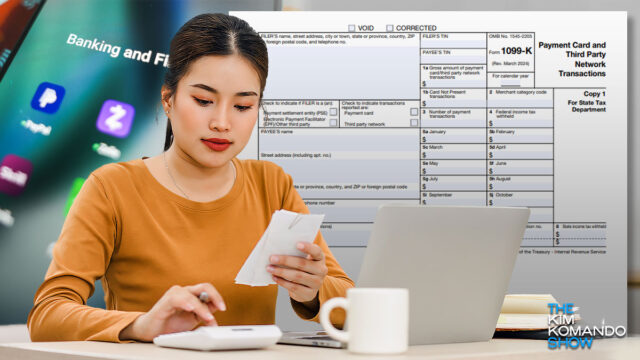Got a side hustle? Watch out for this tax change

Every morning, I sit down with my amazing executive producer, Madi, to plan what tech tidbits I’m going to bring you in my national radio shows, podcasts and this newsletter. Today, she came in with a doozy.
Her boyfriend got an email from the IRS with a tax form he wasn’t expecting. Last year, he made about $20,000 on eBay selling comics, some bikes and a few other things. Like most folks getting a 1099‑K for the first time, he has no idea just how much he’ll owe yet.
If you got paid through an app like Cash App or Venmo, made money online through Etsy or Upwork, or sold a big item on OfferUp last year, you’re going to get a form, too. A big tax change the government’s been hinting at for years is finally here. Disclaimer: I am not a tax expert. If you need tax advice, see a professional.
Wait, it’s finally happening?
These new rules were supposed to start in 2022, but payment apps needed extra time to prepare for the onslaught of paperwork. Yep, billion-dollar companies are confused by taxes, too. It’s not just you.
Why the shift? More folks work side jobs and earn money online than ever. On average, side hustlers make $891 per month — and the government wants a piece of the pie. Shocker, right?
‘Does this impact me?’
If you raked in over $5,000 through a third-party payment app in 2024, then yes. Next year, that limit drops to $2,500. Look out for a 1099‑K from any applicable payment app if that’s you. This includes payments for:
- Goods you sell (think clothing, furniture, electronics, etc.) on apps and sites like Facebook Marketplace, OfferUp, Etsy, Poshmark and eBay.
- Services you provide, like delivery gigs through Uber, Lyft, DoorDash, Postmates and Instacart.
- Freelance work through sites like Fiverr, Upwork and Guru.
If you used Zelle, you’re off the hook for a 1099‑K. Why? Its parent company is backed by big banks like Bank of America, JPMorgan Chase, Wells Fargo and more. Don’t think you can ignore reporting. File it like usual.
So, what if … ?
The IRS doesn’t care about the money you get as gifts or reimbursements. But they will care if you sell upcycled furniture or otherwise through an app. Here are a couple of examples.
Q: My friends paid me back for the concert tickets. Do I have to report that?
A: Nope. Look for an option that indicates you’re sending money to family or friends when you make the transaction, and it won’t show up on your 1099‑K. Here’s how to do that on PayPal.
Q: I run a small business, and these payments are my main income source. What should I do?
A: You should already pay taxes on all your income, no matter where you receive it. This isn’t a new rule — it’s just a change in how you report. If you were paid through third-party payment apps, you’ll get a 1099‑K form.
Pro tip: Start keeping detailed records of everything you sell online. If freelancing is your main source of income, think about making quarterly tax payments to spread it out. You might find that easier.
Now that tax season is here
Double-check everything once you get a 1099‑K form. If you spot errors like a personal transaction marked as a business, contact the app. They can reissue a corrected version. The apps will be swamped as Tax Day approaches, so get this done ASAP.
✅ Save these tips and bookmark the IRS guide so you have it when your forms arrive.
According to unofficial sources, a new simplified income tax form coming soon has only four lines: 1.) What was your income for the year? 2.) What were your expenses? 3.) How much have you left? 4.) Send it in.
